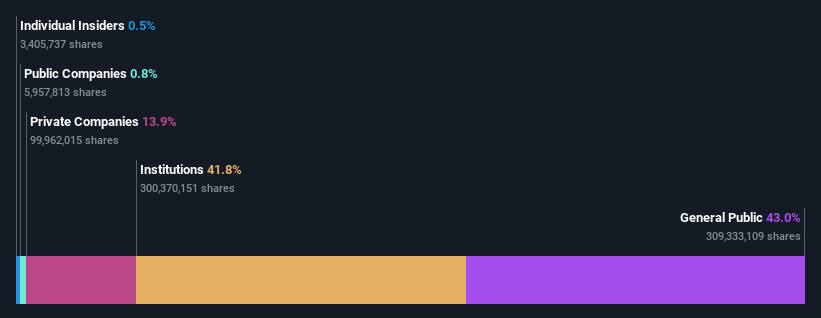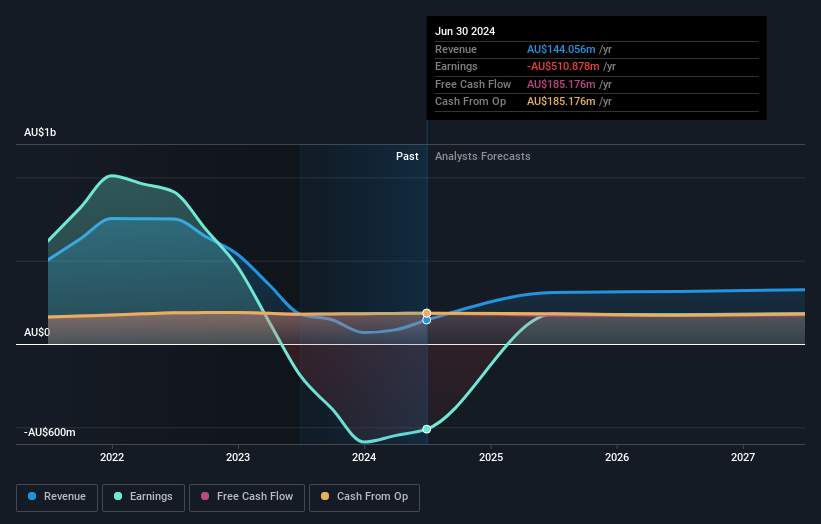Both retail investors who control a good portion of Charter Hall Long WALE REIT (ASX:CLW) along with institutions must be dismayed after last week's 3.7% decrease

Key Insights
- The considerable ownership by retail investors in Charter Hall Long WALE REIT indicates that they collectively have a greater say in management and business strategy
- A total of 12 investors have a majority stake in the company with 50% ownership
- 42% of Charter Hall Long WALE REIT is held by Institutions
To get a sense of who is truly in control of Charter Hall Long WALE REIT (ASX:CLW), it is important to understand the ownership structure of the business. We can see that retail investors own the lion's share in the company with 43% ownership. In other words, the group stands to gain the most (or lose the most) from their investment into the company.
Following a 3.7% decrease in the stock price last week, retail investors suffered the most losses, but institutions who own 42% stock also took a hit.
Let's delve deeper into each type of owner of Charter Hall Long WALE REIT, beginning with the chart below.
See our latest analysis for Charter Hall Long WALE REIT

What Does The Institutional Ownership Tell Us About Charter Hall Long WALE REIT?
Institutions typically measure themselves against a benchmark when reporting to their own investors, so they often become more enthusiastic about a stock once it's included in a major index. We would expect most companies to have some institutions on the register, especially if they are growing.
Charter Hall Long WALE REIT already has institutions on the share registry. Indeed, they own a respectable stake in the company. This can indicate that the company has a certain degree of credibility in the investment community. However, it is best to be wary of relying on the supposed validation that comes with institutional investors. They too, get it wrong sometimes. If multiple institutions change their view on a stock at the same time, you could see the share price drop fast. It's therefore worth looking at Charter Hall Long WALE REIT's earnings history below. Of course, the future is what really matters.

We note that hedge funds don't have a meaningful investment in Charter Hall Long WALE REIT. Our data shows that Charter Hall Funds Management Ltd. is the largest shareholder with 11% of shares outstanding. For context, the second largest shareholder holds about 11% of the shares outstanding, followed by an ownership of 8.8% by the third-largest shareholder.
After doing some more digging, we found that the top 12 have the combined ownership of 50% in the company, suggesting that no single shareholder has significant control over the company.
While studying institutional ownership for a company can add value to your research, it is also a good practice to research analyst recommendations to get a deeper understand of a stock's expected performance. Quite a few analysts cover the stock, so you could look into forecast growth quite easily.
Insider Ownership Of Charter Hall Long WALE REIT
The definition of an insider can differ slightly between different countries, but members of the board of directors always count. The company management answer to the board and the latter should represent the interests of shareholders. Notably, sometimes top-level managers are on the board themselves.
Most consider insider ownership a positive because it can indicate the board is well aligned with other shareholders. However, on some occasions too much power is concentrated within this group.
Our data suggests that insiders own under 1% of Charter Hall Long WALE REIT in their own names. However, it's possible that insiders might have an indirect interest through a more complex structure. It is a pretty big company, so it would be possible for board members to own a meaningful interest in the company, without owning much of a proportional interest. In this case, they own around AU$13m worth of shares (at current prices). It is good to see board members owning shares, but it might be worth checking if those insiders have been buying.
General Public Ownership
The general public, who are usually individual investors, hold a 43% stake in Charter Hall Long WALE REIT. While this size of ownership may not be enough to sway a policy decision in their favour, they can still make a collective impact on company policies.
Private Company Ownership
Our data indicates that Private Companies hold 14%, of the company's shares. Private companies may be related parties. Sometimes insiders have an interest in a public company through a holding in a private company, rather than in their own capacity as an individual. While it's hard to draw any broad stroke conclusions, it is worth noting as an area for further research.
Next Steps:
It's always worth thinking about the different groups who own shares in a company. But to understand Charter Hall Long WALE REIT better, we need to consider many other factors. Case in point: We've spotted 2 warning signs for Charter Hall Long WALE REIT you should be aware of.
If you would prefer discover what analysts are predicting in terms of future growth, do not miss this free report on analyst forecasts.
NB: Figures in this article are calculated using data from the last twelve months, which refer to the 12-month period ending on the last date of the month the financial statement is dated. This may not be consistent with full year annual report figures.
New: AI Stock Screener & Alerts
Our new AI Stock Screener scans the market every day to uncover opportunities.
• Dividend Powerhouses (3%+ Yield)
• Undervalued Small Caps with Insider Buying
• High growth Tech and AI Companies
Or build your own from over 50 metrics.
Have feedback on this article? Concerned about the content? Get in touch with us directly. Alternatively, email editorial-team (at) simplywallst.com.
This article by Simply Wall St is general in nature. We provide commentary based on historical data and analyst forecasts only using an unbiased methodology and our articles are not intended to be financial advice. It does not constitute a recommendation to buy or sell any stock, and does not take account of your objectives, or your financial situation. We aim to bring you long-term focused analysis driven by fundamental data. Note that our analysis may not factor in the latest price-sensitive company announcements or qualitative material. Simply Wall St has no position in any stocks mentioned.
About ASX:CLW
Charter Hall Long WALE REIT
An Australian Real Estate Investment Trust (REIT) listed on the ASX and investing in high quality Australasian real estate assets that are predominantly leased to corporate and government tenants on long term leases.
Reasonable growth potential second-rate dividend payer.


